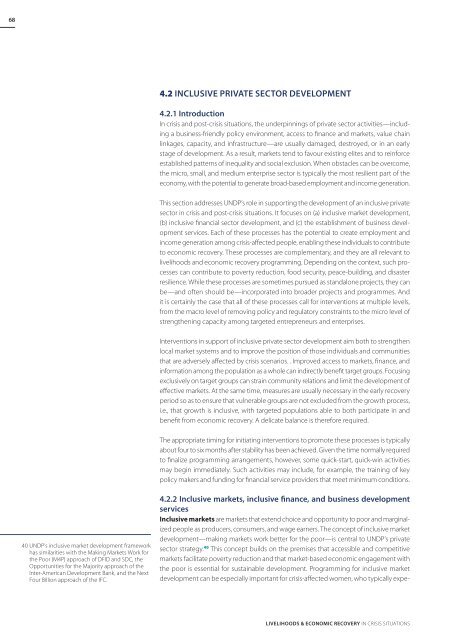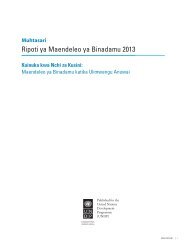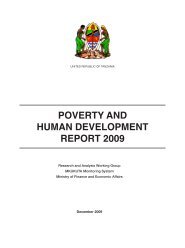Download PDF (4.08 MB) - ReliefWeb
Download PDF (4.08 MB) - ReliefWeb
Download PDF (4.08 MB) - ReliefWeb
Create successful ePaper yourself
Turn your PDF publications into a flip-book with our unique Google optimized e-Paper software.
68<br />
4.2 INCLUSIVE private sector development<br />
4.2.1 Introduction<br />
In crisis and post-crisis situations, the underpinnings of private sector activities—including<br />
a business-friendly policy environment, access to finance and markets, value chain<br />
linkages, capacity, and infrastructure—are usually damaged, destroyed, or in an early<br />
stage of development. As a result, markets tend to favour existing elites and to reinforce<br />
established patterns of inequality and social exclusion. When obstacles can be overcome,<br />
the micro, small, and medium enterprise sector is typically the most resilient part of the<br />
economy, with the potential to generate broad-based employment and income generation.<br />
This section addresses UNDP’s role in supporting the development of an inclusive private<br />
sector in crisis and post-crisis situations. It focuses on (a) inclusive market development,<br />
(b) inclusive financial sector development, and (c) the establishment of business development<br />
services. Each of these processes has the potential to create employment and<br />
income generation among crisis-affected people, enabling these individuals to contribute<br />
to economic recovery. These processes are complementary, and they are all relevant to<br />
livelihoods and economic recovery programming. Depending on the context, such processes<br />
can contribute to poverty reduction, food security, peace-building, and disaster<br />
resilience. While these processes are sometimes pursued as standalone projects, they can<br />
be—and often should be—incorporated into broader projects and programmes. And<br />
it is certainly the case that all of these processes call for interventions at multiple levels,<br />
from the macro level of removing policy and regulatory constraints to the micro level of<br />
strengthening capacity among targeted entrepreneurs and enterprises.<br />
Interventions in support of inclusive private sector development aim both to strengthen<br />
local market systems and to improve the position of those individuals and communities<br />
that are adversely affected by crisis scenarios. . Improved access to markets, finance, and<br />
information among the population as a whole can indirectly benefit target groups. Focusing<br />
exclusively on target groups can strain community relations and limit the development of<br />
effective markets. At the same time, measures are usually necessary in the early recovery<br />
period so as to ensure that vulnerable groups are not excluded from the growth process,<br />
i.e., that growth is inclusive, with targeted populations able to both participate in and<br />
benefit from economic recovery. A delicate balance is therefore required.<br />
The appropriate timing for initiating interventions to promote these processes is typically<br />
about four to six months after stability has been achieved. Given the time normally required<br />
to finalize programming arrangements, however, some quick-start, quick-win activities<br />
may begin immediately. Such activities may include, for example, the training of key<br />
policy makers and funding for financial service providers that meet minimum conditions.<br />
40 UNDP’s inclusive market development framework<br />
has similarities with the Making Markets Work for<br />
the Poor (M4P) approach of DFID and SDC, the<br />
Opportunities for the Majority approach of the<br />
Inter-American Development Bank, and the Next<br />
Four Billion approach of the IFC.<br />
4.2.2 Inclusive markets, inclusive finance, and business development<br />
services<br />
Inclusive markets are markets that extend choice and opportunity to poor and marginalized<br />
people as producers, consumers, and wage earners. The concept of inclusive market<br />
development—making markets work better for the poor—is central to UNDP’s private<br />
sector strategy. 40 This concept builds on the premises that accessible and competitive<br />
markets facilitate poverty reduction and that market-based economic engagement with<br />
the poor is essential for sustainable development. Programming for inclusive market<br />
development can be especially important for crisis-affected women, who typically expe-<br />
Livelihoods & Economic Recovery in Crisis Situations





